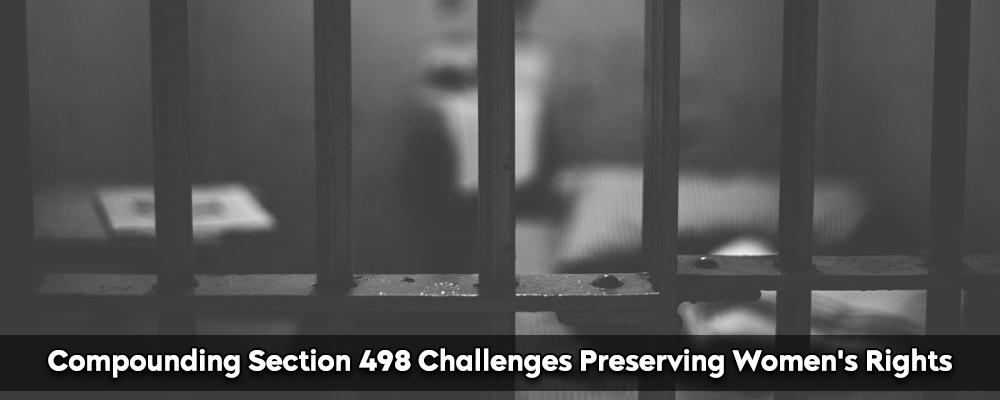The issue of domestic violence remains a pressing concern, with Section 498A of the Indian Penal Code serving as a vital legal provision to protect women from abuse. However, recent discussions surrounding the compoundability of Section 498A have sparked debate. The central argument revolves around whether allowing the compoundability of such cases is truly in the best interest of women. Exploring the potential implications and consequences of making Section 498A compoundable will have broader implications for the fight against domestic violence in India.
Section 498A: Indian Penal Code
Section 498A is a crucial legal provision aimed at addressing the pervasive issue of domestic violence. It criminalizes cruelty by a husband or his relatives towards a woman, encompassing physical, mental, or emotional abuse. The provision has been instrumental in providing legal recourse to countless victims, empowering them to seek justice and protection against abusive relationships.
Compounding Section 498A: Challenging the Preservation of Women’s Rights
The challenges that will be faced after compounding Section 498A of the Indian Penal Code against women’s rights are as follows
- Dilutes the seriousness of domestic violence offenses.
- Undermines the legal recourse available to women facing abuse.
- Potentially discourages survivors from seeking justice and protection.
- Sends a message that the offense can be resolved through monetary settlements rather than through proper legal channels.
- Perpetuates a cycle of abuse by allowing perpetrators to evade appropriate consequences.
- Disempowers women by compromising their agency and control over their own lives.
- Negatively impacts the societal fight against domestic violence by reducing accountability for perpetrators.
- Fails to address the systemic issues contributing to domestic violence and instead promotes a quick resolution that may not adequately address the underlying problems.
- Could lead to survivors feeling coerced or pressured into accepting settlements that do not adequately address their needs for safety and justice.
- Highlights the importance of preserving the non-compoundability of Section 498A to uphold the rights and well-being of women in abusive relationships.
Need A Legal Advice
The internet is not a lawyer and neither are you. Talk to a real lawyer about your legal issue

Making Section 498A Compoundable: The Debate
The proposition to make Section 498A compoundable has raised divided opinions.
Argument by the Proponents
The compoundability of cases could potentially facilitate resolution through mediation, saving time and judicial resources. They assert that in certain circumstances, such as marital discord or misunderstandings, a negotiated settlement may be in the best interest of all parties involved.
Arguments by the Critics
They express concerns over diluting the seriousness of domestic violence and the potential implications for survivors. They contend that domestic violence is a deeply rooted problem that requires a robust legal response and stringent measures to hold perpetrators accountable. Allowing compoundability might discourage survivors from seeking justice, perpetuate the cycle of abuse, and undermine the gravity of the offense.
Protecting Women’s Interests
Section 498A plays a crucial role in safeguarding women’s rights by offering immediate legal protection and acting as a deterrent against domestic violence. It serves as a powerful tool to combat the pervasive issue of abuse within intimate relationships and create a safer environment for women.
Furthermore, Section 498A acts as a catalyst for societal change by raising awareness about the prevalence and consequences of domestic violence. It encourages survivors to break the silence, seek legal assistance, and challenge deeply entrenched gender norms that perpetuate violence within homes.
Role of Support Services
Alongside legal provisions, comprehensive support services play a vital role in addressing domestic violence. Strengthening counselling, helpline networks, and safe shelters can provide survivors with the necessary emotional, psychological, and physical support to rebuild their lives. These services should focus on empowering survivors, increasing awareness of legal rights, and fostering a supportive environment that encourages reporting and seeking justice.
Conclusion
While the debate surrounding the compoundability of Section 498A in domestic violence cases continues, the fundamental objective must remain the protection and empowerment of women. Preserving the non-compoundability of Section 498A ensures that survivors have access to legal remedies, promotes a strong deterrent against domestic violence, and highlights the seriousness of the offense.
However, it is equally important to continuously evaluate and strengthen support systems, including counselling and helpline networks, to provide survivors with comprehensive assistance and promote a society free from the scourge of domestic violence.
One can talk to a lawyer at Lead India for any kind of legal advice. In India, free legal advice online is available by Lead India. Along with getting free legal advice online, you can ask questions to experts online free at Lead India.





 Talk to a Lawyer
Talk to a Lawyer